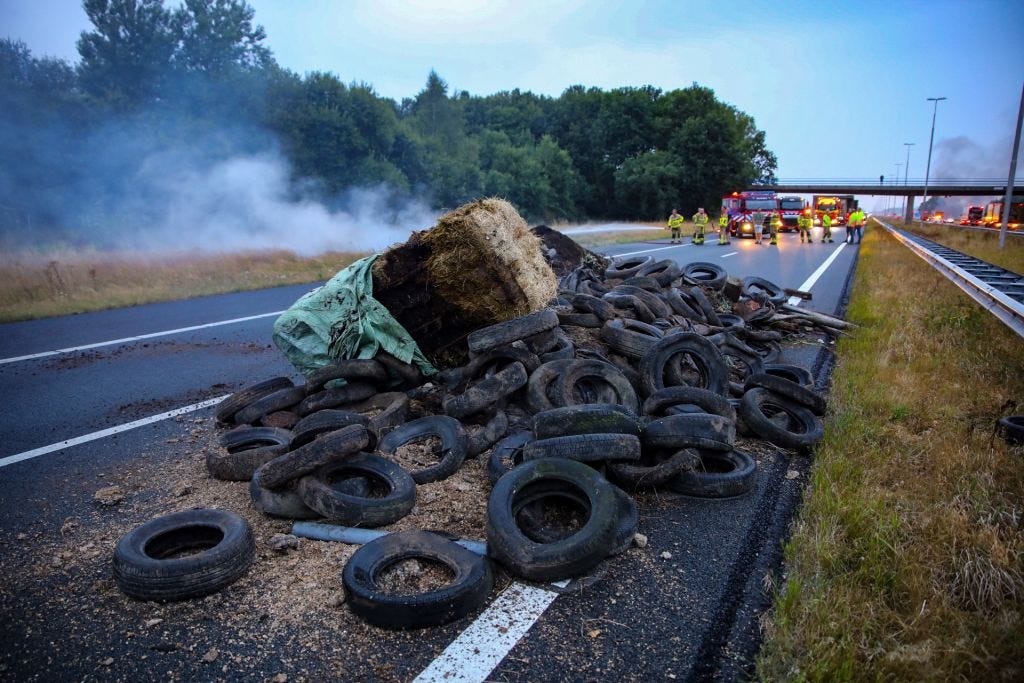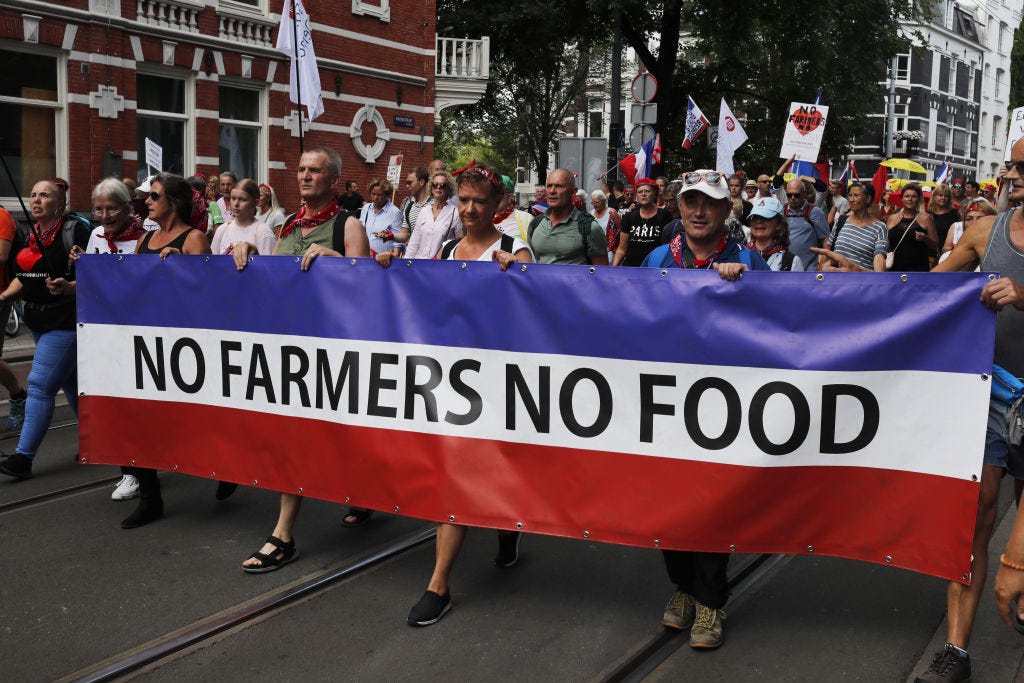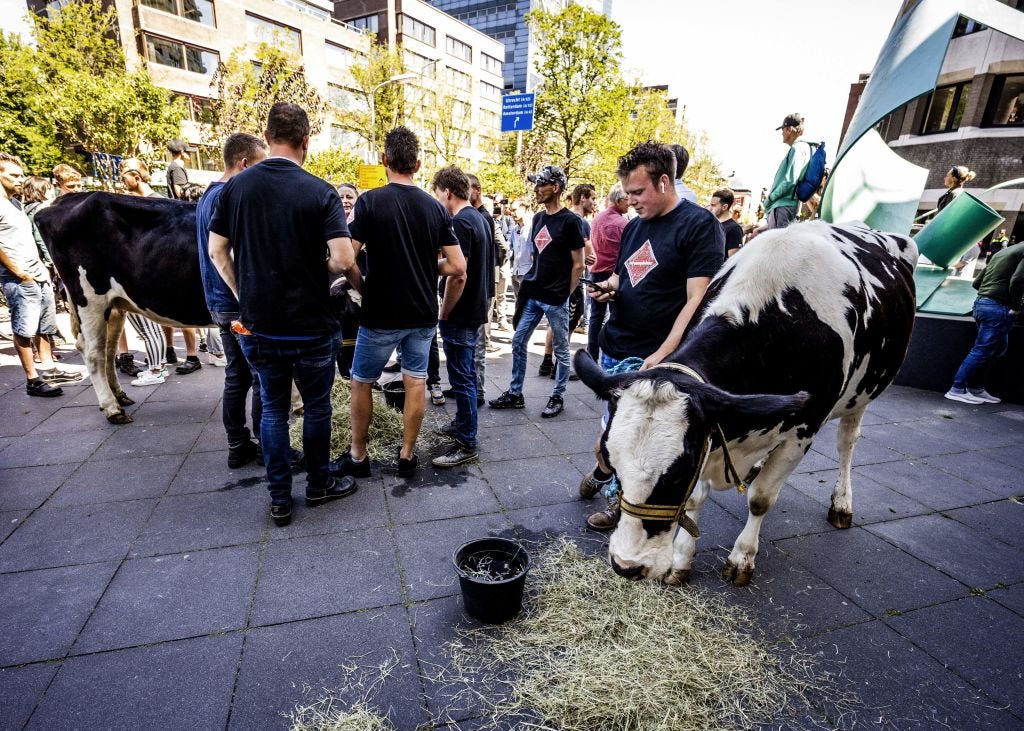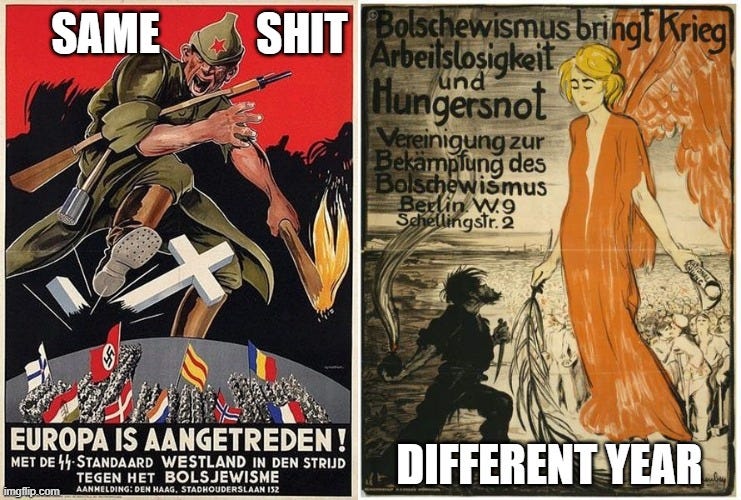Protocol No. 6 – Take-Over Technique (agriculture)
PROTOCOLS OF THE MEETINGS OF THE LEARNED ELDERS OF ZION
❝We shall raise the rate of wages which, however, will not bring any advantage to the workers, for, at the same time, we shall produce a rise in prices of the first necessaries of life, alleging that it arises from the decline of agriculture and cattle-breeding: we shall further undermine artfully and deeply sources of production, by accustoming the workers to anarchy . . .❞
PROTOCOLS OF THE MEETINGS OF THE LEARNED ELDERS OF ZION
Protocol No. 6 – Take-Over Technique
1. We shall soon begin to establish huge monopolies, reservoirs of colossal riches, upon which even, large fortunes of the GOYIM will depend to such an extent that they will go to the bottom together with the credit of the States on the day after the political smash …
2. You gentlemen here present who are economists, just strike an estimate of the significance of this combination! …
3. In every possible way we must develop the significance of our Super-Government by representing it as the Protector and Benefactor of all those who voluntarily submit to us.
4. The aristocracy of the GOYIM as a political force, is dead – We need not take it into account; but as landed proprietors they can still be harmful to us from the fact that they are self-sufficing in the resources upon which they live. It is essential therefore for us at whatever cost to deprive them of their land. This object will be best attained by increasing the burdens upon landed property – in loading lands with debts. These measures will check land – holding and keep it in a state of humble and unconditional submission.
5. The aristocrats of the GOYIM, being hereditarily incapable of contenting themselves with little, will rapidly burn up and fizzle out.
WE SHALL ENSLAVE GENTILES
6. At the same time we must intensively patronize trade and industry, but, first and foremost, speculation, the part played by which is to provide a counterpoise to industry: the absence of speculative industry will multiply capital in private hands and will serve to restore agriculture by freeing the land from indebtedness to the land banks. What we want is that industry should drain off from the land both labor and capital and by means of speculation transfer into our hands all the money of the world, and thereby throw all the GOYIM into the ranks of the proletariat. Then the GOYIM will bow down before us, if for no other reason but to get the right to exist.
7. To complete the ruin of the industry of the GOYIM we shall bring to the assistance of speculation the luxury which we have developed among the GOYIM, that greedy demand for luxury which is swallowing up everything. WE SHALL RAISE THE RATE OF WAGES WHICH, HOWEVER, WILL NOT BRING ANY ADVANTAGE TO THE WORKERS, FOR, AT THE SAME TIME, WE SHALL PRODUCE A RISE IN PRICES OF THE FIRST NECESSARIES OF LIFE, ALLEGING THAT IT ARISES FROM THE DECLINE OF AGRICULTURE AND CATTLE-BREEDING: WE SHALL FURTHER UNDERMINE ARTFULLY AND DEEPLY SOURCES OF PRODUCTION, BY ACCUSTOMING THE WORKERS TO ANARCHY AND TO DRUNKENNESS AND SIDE BY SIDE THEREWITH TAKING ALL MEASURE TO EXTIRPATE FROM THE FACE OF THE EARTH ALL THE EDUCATED FORCES OF THE “GOYIM.”
8. IN ORDER THAT THE TRUE MEANING OF THINGS MAY NOT STRIKE THE “GOYIM” BEFORE THE PROPER TIME WE SHALL MASK IT UNDER AN ALLEGED ARDENT DESIRE TO SERVE THE WORKING CLASSES AND THE GREAT PRINCIPLES OF POLITICAL ECONOMY ABOUT WHICH OUR ECONOMIC THEORIES ARE CARRYING ON AN ENERGETIC PROPAGANDA
http://www.renegadetribune.com/protocols-of-zion-protocol-vi-take-over-technique/
❝What we want is that industry should drain off from the land both labor and capital and by means of speculation transfer into our hands all the money of the world, and thereby throw all the GOYIM into the ranks of the proletariat. Then the GOYIM will bow down before us, if for no other reason but to get the right to exist.❞
https://time.com/6201951/dutch-farmers-protests-climate-action/
Farmer Protests in the Netherlands Show Just How Messy the Climate Transition Will Be

BY CIARA NUGENT
JULY 29, 2022 10:45 AM EDT
Astandoff between Dutch farmers and their government is causing havoc in the Netherlands this summer. Protesters have withheld deliveries from grocery stores, smeared manure outside the home of the agriculture minister, and blocked highways with hay bales and tires. “That’s what you get when you make people so very angry,” Sieta van Keimpema, secretary of the Farmers Defense Force (FDF), said July 27 as the group launched a fresh round of demonstrations.
What’s driving the dispute? Manure. The Netherlands’ intensive livestock farming system produces an unusual excess of animal feces. When mixed with urine, those feces give off ammonia and nitrous oxide. The former is a pollutant that can leak into air and water, harming local wildlife. The latter is a potent greenhouse gas that traps heat in our atmosphere: the Intergovernmental Panel on Climate Change says nitrous oxide accounts for around 6% of global greenhouse gas emissions.
Watch More
In June, the Netherlands unveiled a world-leading target to halve emissions of the gasses, as well as other nitrogen compounds that come from fertilizers, by 2030, to tackle their environmental and climate impacts. The government said it was leading an “unavoidable transition” for agriculture. Farmers can reduce the release of nitrogen compounds by changing how they manage their cows: feeding them less protein, or using water to dilute manure, for example. But the target is expected to require a 30% reduction in overall livestock numbers, and experts say many farms will have to shut down. Farmers are demanding that the government rethink the plan before it becomes law later this year.
Mohamed Farouk Batiche—
Mohamed Farouk Batiche—
Trienke Elshof, a dairy farmer with 250 cows in the northern province of Friesland, says farmers feel blindsided: for decades, governments have encouraged them to increase yields. Meanwhile, other high-polluting industries, such as aviation, construction, and transport, have yet to face such severe environmental rules. “We know we have to do something about nitrogen, but not in this top-down way, and not at this speed,” she says. “It feels like they want to get rid of all the farmers in the Netherlands.”
The farmers’ plight is stirring a thorny debate on climate action, with implications well beyond the Netherlands. A wave of solidarity protests have taken place in recent weeks, from Germany to Canada. Some have been organized by people who view the measures as an attack on workers’ rights and small businesses. But far-right figures and conspiracy theorists have also gotten involved. Twitter is filled with posts linking the Netherlands’ nitrogen policy to the Great Reset—a theory that claims international elites are trying to use the COVID-19 pandemic to establish an authoritarian global government. On July 7, Fox News’s Tucker Carlson featured a guest wrongly claiming the policy is designed to clear land for use by migrants. And at a July 23 rally former U.S. President Donald Trump praised the farmers for fighting their governments’ “climate tyranny.”
This may be just the beginning of much wider global unrest over agriculture. Scientists say dealing with climate change will require not just gradual reform, but a rapid, wholesale transformation of the global food system. As one of the world’s most densely farmed nations, the Netherlands is one of the first countries to grapple with how that upheaval will impact farmers—and how messy the transition will be. It won’t be the last.
More bullshit from CIA propaganda TIME
This video file cannot be played.(Error Code: 102400)
How the Netherlands’ got here
The Netherlands is famous for its highly productive agriculture industry. In the years following the Second World War, during which the country suffered a famine due to Nazi blockades, Dutch farmers led a drive to increase the amount of food that could be grown on their relatively small territory. That meant rolling out greenhouses, vertical farming, and other efficiency-improving technologies, and also cramming in 238 cows per square mile as of 2021, compared to around 100 in the U.K., and 81 in Germany. By value, it’s the world’s fourth largest dairy exporter and second largest overall food exporter, after the U.S. The Dutch earn more from agriculture than Brazil—a country whose territory is 205 times larger.
But all that has come at a cost. Dutch cows produce so much manure that farmers struggle to dispose of it safely. As a result, ammonia pollution is affecting air quality in some areas. And agriculture accounts for 86% of the country’s nitrous oxide emissions, which drive up the country’s contribution to global warming. Meanwhile, intensive fertilizer use has led to toxic algae blooms in the country’s waterways that kill fish and make lakes dangerous to swim in.
Farmers demonstrate with their cows outside the House of Representatives building, as MPs are debating the cabinet's nitrogen plans during a farmers' protest against the cabinet's proposed nitrogen policy in the Hague, on June 28, 2022.
Jeffrey Groeneweg—ANP/AFP/Getty Images
In 2018, after a lawsuit brought by an environmental NGO, the European Court of Justice ruled that the Netherlands’ policy to tackle its outsize nitrogen pollution problem was too weak and violated E.U. law. When a new coalition government formed in June this year, they unveiled plans to dramatically accelerate pollution reduction. Nationally, nitrogen pollution must be cut by 50% by 2030, with regions near protected nature reserves expected to cut pollution by 70%.
Farming’s global environment problem
The Netherlands’ pursuit of farming efficiency is an extreme version of agricultural expansion that has taken place across the rest of the world over the last century. The environmental consequences are not limited to nitrogen pollution. Worldwide, the amount of land used for crops and livestock doubled over the course of the 20th century, requiring the clearing of forests that once sheltered biodiversity and helped keep our climate stable by sequestering carbon. An increase in the global population of methane-belching cows, now over a billion-strong, has doubled atmospheric levels of the potent greenhouse gas since 1900. Farming is also responsible for 70% of the fresh water we consume each year.
Environmentalists say we need to reduce the toll farming takes on nature, by eating less meat and growing crops in less harmful ways, while at the same time make our food systems more resilient to the heat, drought, storms, and flooding that will be intensified by climate change.
The Netherlands’ bold agricultural policy, which tackles multiple environmental problems at once and comes with a $25 billion fund to help provinces and farmers transition, is a promising step, according to Natasja Oerlemans, head of the food team at WWF Netherlands. “This is the first time the government has been willing to take ambitious, comprehensive measures,” she says. “And because [of the budget], it can allow farmers to take a new direction.”
What’s making farmers so angry?
But for Dutch farmers, that new direction feels unclear: the government announced the target without specifying how the $25 billion will be distributed, or how provinces will decide who gets to keep their cows, or if there will be involuntary buyouts. The uncertainty has helped fuel anger.
Elshof says she doesn’t know what will happen to her farm if the target becomes law. She might be able to sell off 30 cows, but much more than that would make her business untenable. If other farmers in her region sell their farms, Elsof and her husband, both in their 50s, might be able to keep their cows, she says. Otherwise, they may be forced into early retirement. Their son, currently studying at an agricultural high school, is rethinking his life-long plan to become a farmer.
The government sent a mediator to meet with farmers’ organizations on July 26, in a bid to convince them that the target is workable. But unions said they didn’t consider the mediator—a member of Prime Minister Mark Rutte’s party—independent. They warned they won’t meet with him until the government promises “serious discussions” on the target and its timeline, suggesting the dispute is likely to continue.
The Netherlands’ farmers protests are probably the largest uprising over environmental regulation of agriculture that the world has seen in the climate action era. But similar tensions have been bubbling elsewhere. Farmers in Spain, Ireland, and New Zealand have all staged demonstrations in their capitals to challenge green reforms in the last few years. Populists in the U.S. and Europe, including France’s Marine Le Pen, are seizing on the protests to cast climate action as a conflict between rural heartlands, working people, and urban elites.
Elshof, who marched in a June protest but hasn’t joined the more disruptive efforts, says governments and climate advocates hoping to enact environmental reforms need to communicate better and offer more support if they want farmers to make a rapid change. “The world now wants us to see ourselves as keepers of the environment and nature—and that’s so new,” she says. Overhauling a food system on which we all rely “is the responsibility of the whole community, not just farmers,” she adds. “We cannot do this alone.”
Het joodse messianisme verspreidt al bijna tweeduizend jaar zijn giftige boodschap onder ons. Democratische en communistische universalismen zijn nieuwer, maar versterken alleen maar het oude joodse verhaal. Dit zijn dezelfde idealen...
De transnationale, transraciale, transseksuele, transculturele idealen die deze ideologieën ons prediken (buiten ras, mensen, cultuur) en die de dagelijkse voeding zijn van onze scholen, in de media, in onze popcultuur, bij onze universiteiten en op onze straten . . . hebben zijn onze biosymbolische identiteit en onze etnische trots teruggebracht tot hun minimale uitdrukking.
Geen enkel land voert zijn eigen race tijdens deze invasie, omdat het allemaal een politieke agenda is die wordt geleid door de VN en naar voren wordt geschoven door de Joden en hun marionetten (politici). Meeste mensen gewoon niet zullen weten of begrijpen dat dit een politieke agenda is. Sommigen slagen er echter in te begrijpen dat de politici opzettelijk werken om moslims te importeren en de mensen te vervangen, maar daar houdt het op, ze zijn als een computer die niet verder kan omdat het programma het niet toestaat.







Thanks CWS. The "free" world's people are so close to raw anger boiling over into physical rioting.